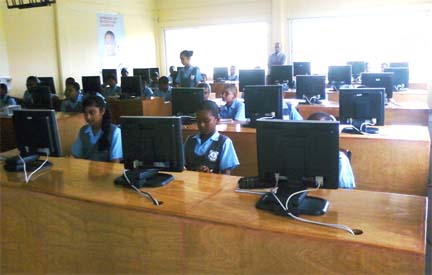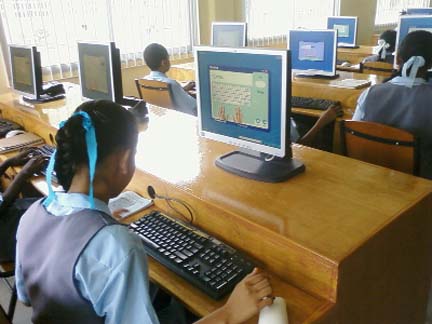SchoolNet Guyana, a pilot project for the computerisation of secondary schools countrywide, was launched yesterday.

The computer based literacy programme is being implemented by the Ministry of Education (MoE), in collaboration with the Canadian non-profit organisation Global Partnership for Literacy (GPL).
Speaking at a new laboratory opened at the Diamond Secondary School to commemorate the project, Minister of Education Sheik Baksh said SchoolNet Guyana complements the ministry’s five year computer literacy plan, which is expected to see all the secondary schools in Guyana equipped with computer labs. The government is keeping computer literacy on its priority list, he said, while noting President Bharrat Jagdeo’s promise in his New Year message. A lot of money, Baksh added, was invested in the computerisation programme last year. When the MoE approached the cabinet for more funds, he explained, President Jagdeo gave his support and urged that the ministry complete the “shells,” which will house the computer labs at the end of this year.
By completing the necessary infrastructure, Baksh stressed, GPL’s computers given to us through the SchoolNet Guyana project will be put to use immediately. The minister urged that everyone involved in the computer literacy project move swiftly. Efficient work will hopefully lead to the project exceeding its target, he said. It is also MoE’s long term aim, Baksh said, to provide computers for households in Guyana. “It is important that we bring technology to the country,” he declared, “We have to condition the human resources for development.”
In two weeks, Baksh revealed, the Success Maker Software (SMS) in the SchoolNet Guyana computer lab at Diamond Secondary will be implemented. This program has improved numeracy and literacy levels in schools. SMS was implemented in 10 schools over the last two years, including the Kwakwani and Sophia primary schools.
It was Baksh who raised the questions of maintaining the computer labs once they are implemented by SchoolNet Guyana; and the training of teachers in time to use these and teach students. If, after a period of time, the networks implemented at the schools stop functioning then it would have cancelled the projects objectives.
Project objectives
GPL has merged SchoolNet with the MoE’s Computerisation of Schools Project to integrate the ministry’s Information and Communication Technology (ICT) programme into schools and communities across Guyana. The project is being funded jointly by MoE and GPL, which is currently seeking funds from donors and partnership groups. There are four ways to help SchoolNet Guyana become a success, GPL Canada Chairman Danny Doobay said at the gathering. Organisations or individuals can partner with GPL in implementing the project; donate to the programme or a specific school; become a SchoolNet volunteer or sponsor IT scholarships at the University of Guyana.
SchoolNet Guyana has five key elements. System-wide ICT infrastructure is the first component. Its objective is to equip every school with a computer lab consisting of a small LAN (Local Area Network), 30 computers, internet connection and video projection for easy learning.
Professional development, training and capacity building as it relates to Information Technology is the programme’s second element. SchoolNet will provide training for teachers in computers and computer aided instruction; and will equip them for capacity building with Parent Teacher Associations (PTA) across the country.
The third component of the programme will assist MoE in creating digital content. Guyanese, at the end of the programme, will have access to educational information online.
In addition to making resources available online SchoolNet Guyana will aid the ministry in securing software (computer programs) which improves the delivery of education and its management system. Distance learning will be facilitated in this section of the project.
Finally, SchoolNet Guyana aims to facilitate ICT dissemination. It will cooperate with relevant organisations to develop programmes that extend the use of ICT beyond the classroom via multimedia community booths across the country.
Swift minds
The programme, according to Doobay, requires open minds and willingness to accept change and change the way in which things are done. The big question is: Will it work? Only if change is accepted, Doobay said, and there are swift minds which can absorb what is being taught. Anything less will result in the failure, he said, citing a similar case in Trinidad and Tobago, which borrowed $100M from the International Development Bank for a programme that ultimately failed. More than 50 percent of computer systems put in place under the project were not working, while teachers trained during that project either didn’t have access to computers or had access to training but had no computers. By using the Trinidadian case as a learning experience, Doobay stated, the mistakes they made can be avoided and in so doing ensure SchoolNet Guyana is successful. The Trinidadian case highlights the importance for the balance in training and the provision of computers as well as the importance of maintenance.
A call centre located opposite the Diamond Secondary, he said, has full time technical persons on staff. This company, according to Doobay, has offered its technical skills free of cost to the school’s computer lab.
During the last several months SchoolNet Guyana has been developing three pilot programmes, inclusive of the Diamond lab. They will complete the other two laboratories within a few weeks, Doobay said, and observations will commence to determine whether other specifications, aside from those employed by SchoolNet’s engineers, will be needed for the standardised labs.
After the observations are completed a report will be submitted to the Ministry of Education for its approval, which would see SchoolNet Guyana move on to other schools.
Computer literacy is now an essential component in our education. Outside of manual labour there are few areas on the job market which don’t require computer experience. In the near future, Doobay stressed, there may be no positions which don’t require some amount of computer know how. It is in this framework GPL set out to develop the SchoolNet Guyana programme: a five year geo-literacy programme targeting, in the initial stages, the secondary schools. The local branch of GPL is headed by Geoff Da Silva.

